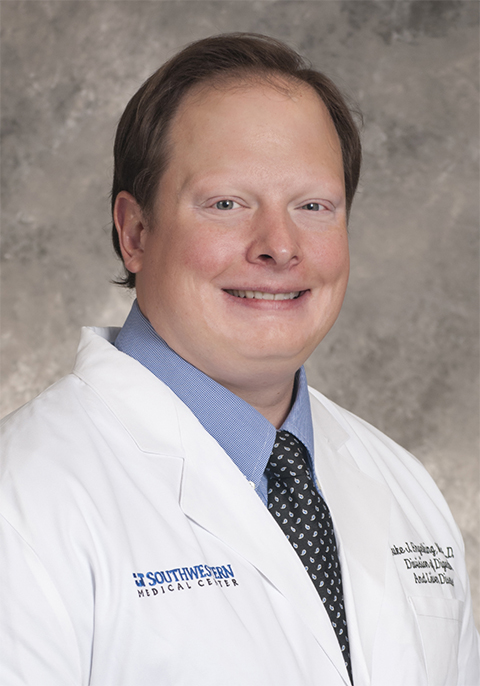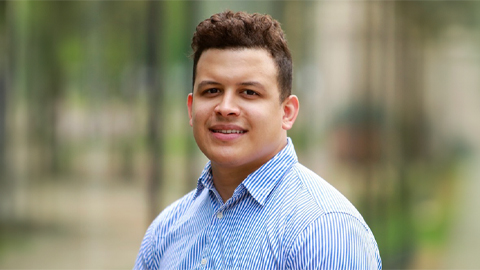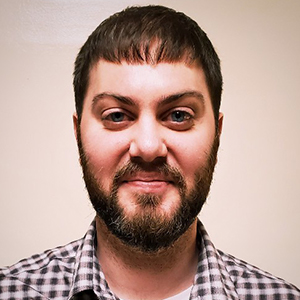
Engelking seeks to balance research and medicine
When he was young, Luke Engelking’s mother asked him what he wanted to be when he grew up. His answer? “’A mad scientist,’” he said.
Engelking certainly was exposed to the idea of a career in science and medicine early, as his mother pursued a second career as a physician’s assistant during his high school years. “Unfortunately, she had a number of rare autoimmune diseases and was often in and out of doctors’ offices,” Engelking said. “From then on, I always knew I wanted to go to med school. However, I wasn’t always certain that I wanted a Ph.D.”

Engelking ended up doing both. He went to medical school at the University of Texas Southwestern Medical Center, where he got his M.D.–Ph.D. in the lab of Nobel laureates Michael Brown and Joe Goldstein, best known for their discovery of the low-density lipoprotein receptor and its regulation of cholesterol metabolism. He enjoyed working with Brown and Goldstein.
“It was a very productive time,” Engelking said. “I really didn’t appreciate working under their aegis when I was doing it. … Once you’re out on your own, everything is more of a struggle.”
Engelking has embraced that struggle. After a residency at Massachusetts General Hospital and a clinical and research fellowship back at UT Southwestern, he not only began seeing patients as an attending physician but also opened his own research lab as an assistant professor in the departments of internal medicine and molecular genetics, studying the role of sterol receptor element-binding proteins in colon cancer growth and progression.
Now an associate professor, Engelking balances his time between seeing patients and conducting research. In addition, he is working to establish a clinical research program in colon cancer genetics so data on mutations of enrolled patients can be made publicly available to researchers at UT Southwestern and around the world.
“It’s my hope that we’ll be able to synergize the clinical work with the work going on in the lab,” he said. “It’s a challenge to try to get all of this work to align — I hope I’m making progress, but we’re not quite there yet.”
Identifying markers of cancer cell proliferation in the intestine
As a physician, Luke Engelking practices adult gastroenterology, focusing on patients with inherited mutations that lead to colorectal cancers as in Lynch and familial adenomatous polyposis, or FAP, syndromes.
In the Engelking lab, research focuses on the roles of lipids in intestinal epithelial cell growth. The lab uses Cre-lox and CRISPR tools to alter gene expression, RNA-seq and lipidomics to profile cell markers, and intestinal organoids from both humans and mice as model systems.
The researchers hope that discovering novel mechanisms by which sterol receptor element-binding proteins, or SREBPs, regulate tumor cell growth and proliferation will present new drug targets for the treatment of colon cancer. Recently, the lab demonstrated that selective loss of SREBP-2, which blocks cholesterol synthesis, leads to overgrowth and increased proliferation of intestinal progenitor cells.
“What I really hope to do is move toward patient-oriented studies,” Engelking said. “Perhaps we’ll find patients with FAP phenotypes but unknown genetic markers. There are any number of genetic unknowns that impact underlying cancer biology.”
Enjoy reading ASBMB Today?
Become a member to receive the print edition monthly and the digital edition weekly.
Learn moreGet the latest from ASBMB Today
Enter your email address, and we’ll send you a weekly email with recent articles, interviews and more.
Latest in People
People highlights or most popular articles

This MOSAIC scholar believes in the power of perseverance
Wagner Silva Dantas aims to develop new approaches to reducing fat mass while preserving muscle mass by studying a crucial regulator for maintaining redox balance.

ASBMB honors 2024 outstanding student chapter
Founded just three years ago, the University of South Alabama chapter shows leadership in educational activities, commitment to increasing public scientific awareness and more.

Honors for Shan, Landick and Bankston
Awards, promotions, milestones and more. Find out what's going on the lives of ASBMB members.

In memoriam: Ulrich auf dem Keller
A professor at the Technical University of Denmark, he was a leader in wound healing research and mass spectrometry-based proteomics technology.

MOSAIC scholar explores enzymes
Organic chemist Edwin Alfonzo's scientific journey took an unexpected turn when he discovered the world of enzymes.

Honors for Wright, Chiu and Flanegan
Awards, promotions milestones and more. Find out what's going on in the lives of ASBMB members.

